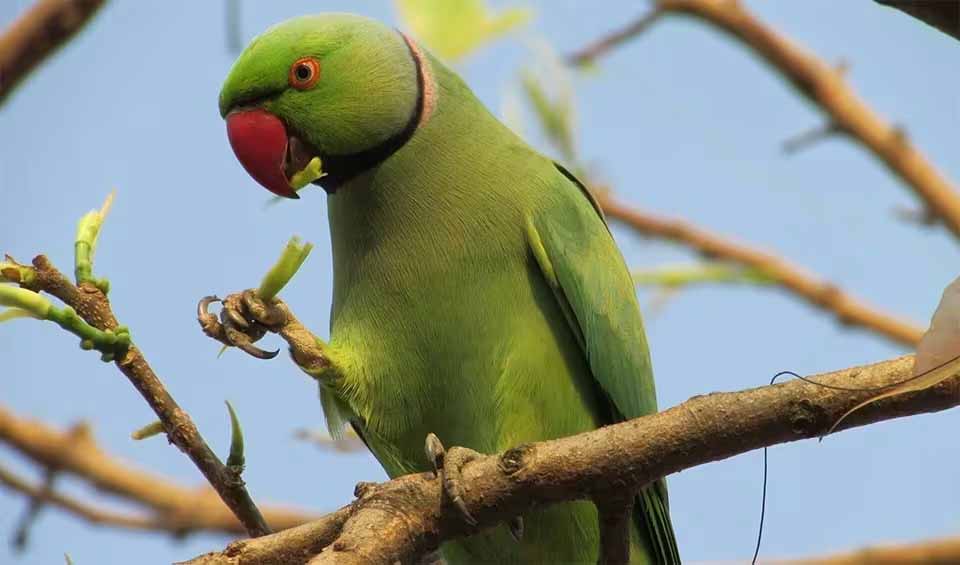The Rose-ringed parakeet, also known as the Ring-necked parakeet, is a charismatic and colorful bird native to parts of Africa and South Asia. Its distinguishing feature is the red and black ring around its neck, which contrasts beautifully with its vibrant green plumage.
These parakeets are known for their complex social structures and breeding behaviors. Mated pairs form strong bonds and work together to raise their young. While the female is primarily responsible for incubating the eggs, both parents share the duties of feeding and caring for the chicks once they hatch. The parental duties of Rose-ringed parakeets are demanding, as the chicks rely on their parents for nourishment and protection for up to two years.
In terms of diet, Rose-ringed parakeets are herbivores with a diverse palate. They feed on a variety of foods, including fruits, vegetables, cereal grains, dates, berries, and seeds. However, their feeding habits can sometimes bring them into conflict with farmers, who may view them as pests due to crop damage.
Despite potential conflicts with farmers, Rose-ringed parakeets are beloved by bird enthusiasts and pet lovers alike. Their playful and intelligent nature makes them popular companions, and they are known for their ability to learn and mimic a wide range of sounds, earning them the title of “best impersonator” among parrot species.
Distribution
 Afghanistan
Afghanistan Austria
Austria Official estimate
Official estimate
 Bahrain
Bahrain Bangladesh
Bangladesh Belgium
Belgium Official estimate
Official estimate
 Benin
Benin Bhutan
Bhutan Burkina Faso
Burkina Faso Cameroon
Cameroon Cape Verde
Cape Verde Central Af. Rep.
Central Af. Rep. Chad
Chad China
China Cuba
Cuba Côte D’ivoire
Côte D’ivoire Djibouti
Djibouti Egypt
Egypt Eritrea
Eritrea Ethiopia
Ethiopia France
France Official estimate
Official estimate
 Gambia
Gambia Germany
Germany Official estimate
Official estimate
 Ghana
Ghana Guinea-Bissau
Guinea-Bissau Guinea
Guinea Hong Kong
Hong Kong India
India Iran
Iran Iraq
Iraq Israel
Israel Italy
Italy Official estimate
Official estimate
 Japan
Japan Jordan
Jordan Kenya
Kenya Kuwait
Kuwait Lebanon
Lebanon Liberia
Liberia Macao
Macao Maldives
Maldives Mali
Mali Mauritania
Mauritania Mauritius
Mauritius Myanmar
Myanmar Nepal
Nepal Netherlands
Netherlands Official estimate
Official estimate
 Niger
Niger Nigeria
Nigeria Oman
Oman Pakistan
Pakistan Portugal
Portugal Official estimate
Official estimate
 Puerto Rico
Puerto Rico Qatar
Qatar Saudi Arabia
Saudi Arabia Senegal
Senegal Sierra Leone
Sierra Leone Singapore
Singapore Slovenia
Slovenia Somalia
Somalia South Africa
South Africa South Sudan
South Sudan Spain
Spain Official estimate
Official estimate
 Sri Lanka
Sri Lanka Sudan
Sudan Syria
Syria Togo
Togo Turkey
Turkey Official estimate
Official estimate
 UAE
UAE Uganda
Uganda United Kingdom
United Kingdom Official estimate
Official estimate
 United States
United States Venezuela
Venezuela Vietnam
Vietnam Yemen
YemenAnything we've missed?
Help us improve this page by suggesting edits. Glory never dies!
Suggest an editGet to know me
Terrestrial / Aquatic
Altricial / Precocial
Polygamous / Monogamous
Dimorphic (size) / Monomorphic
Active: Diurnal / Nocturnal
Social behavior: Solitary / Pack / Herd / Flock
Diet: Carnivore / Herbivore / Omnivore / Piscivorous / Insectivore
Migratory: Yes / No
Domesticated: Yes / No
Dangerous: Yes / No




